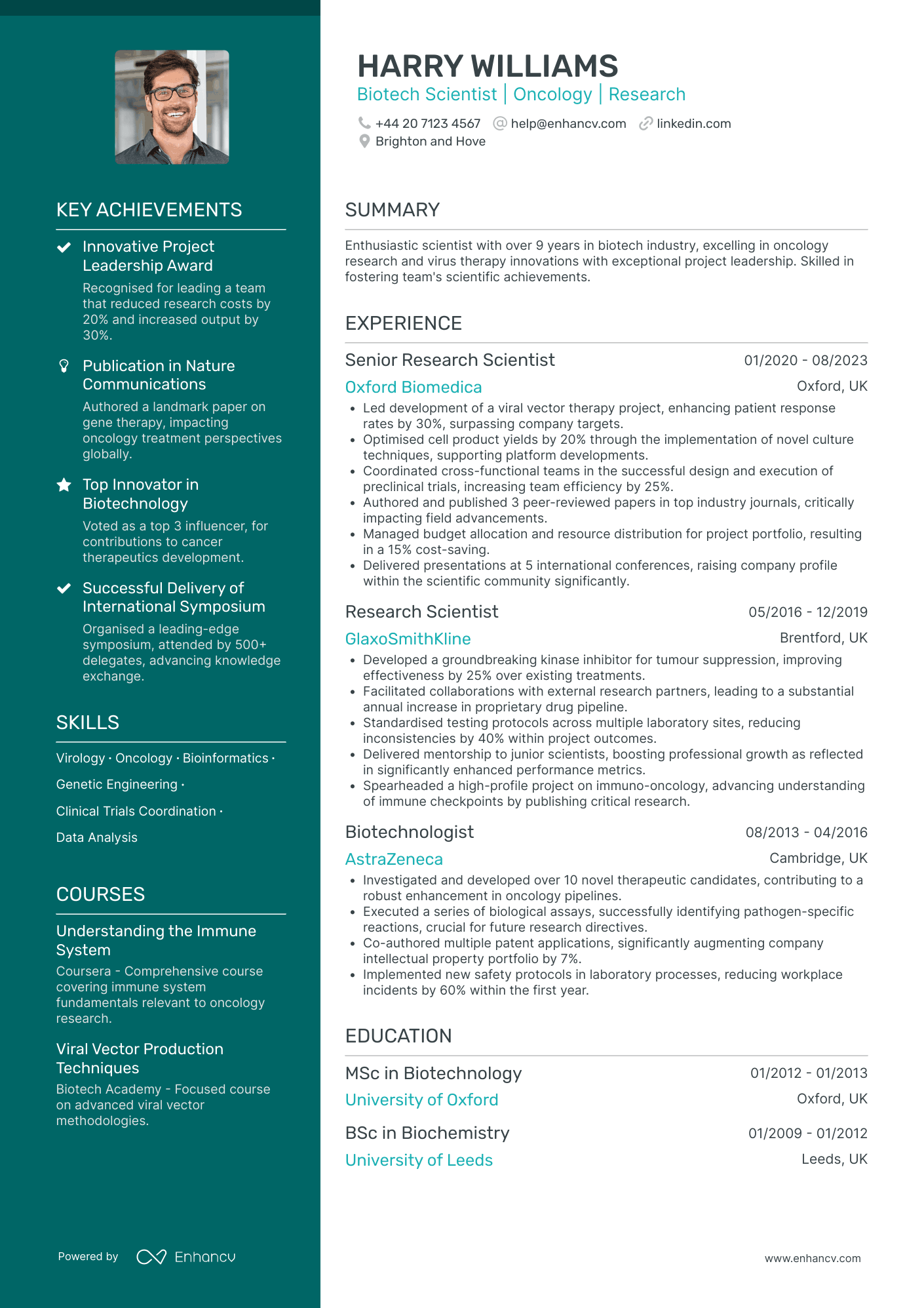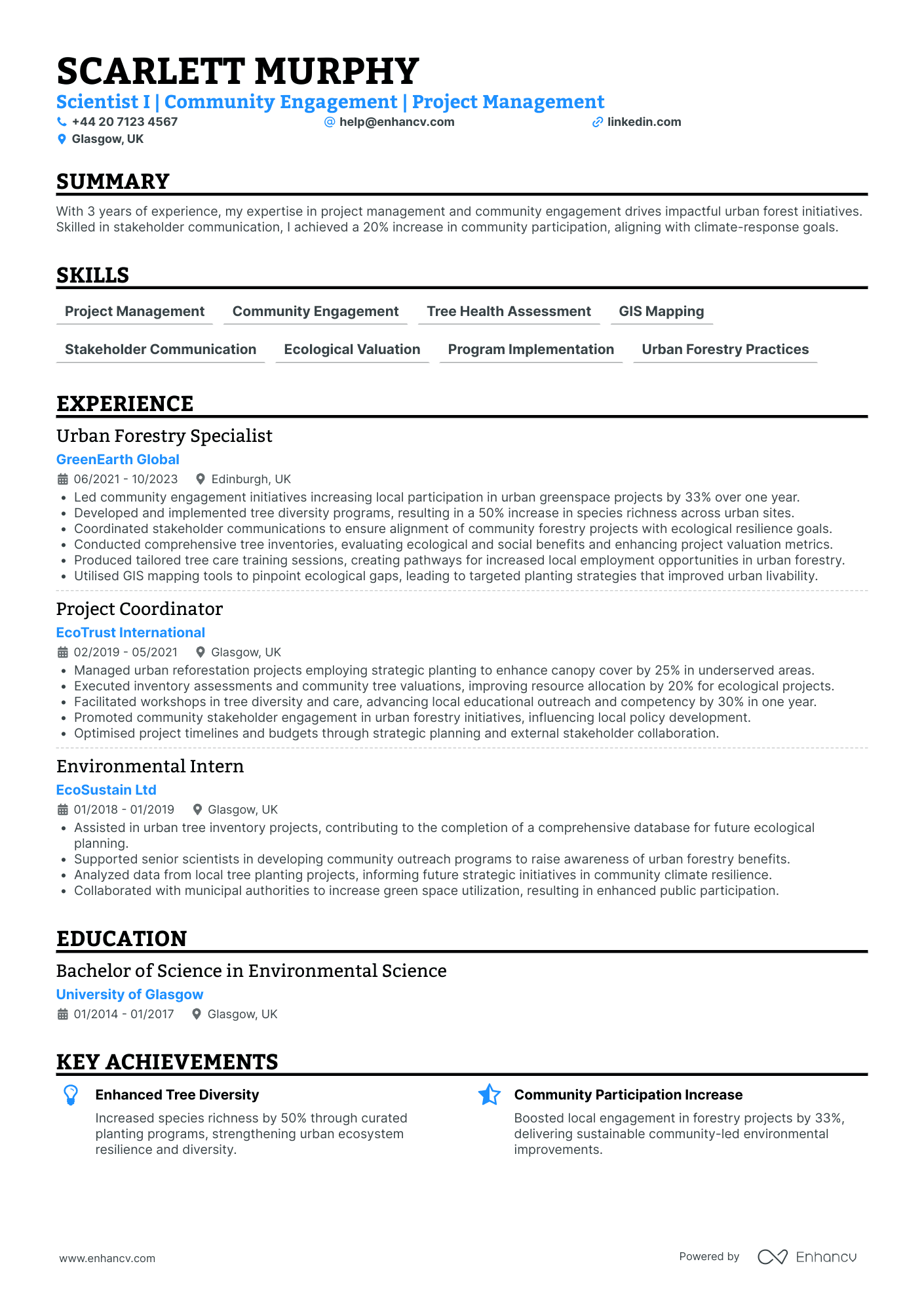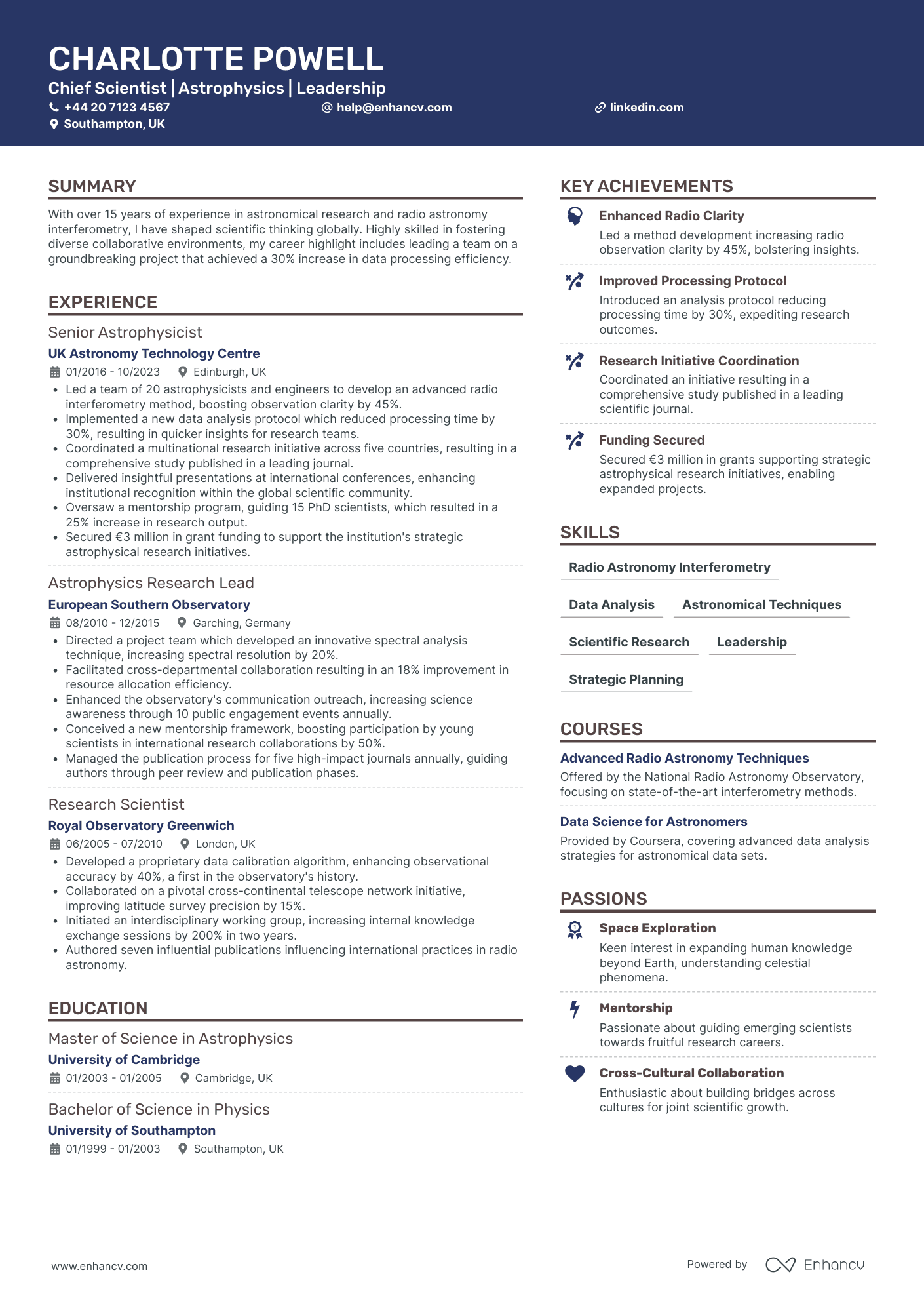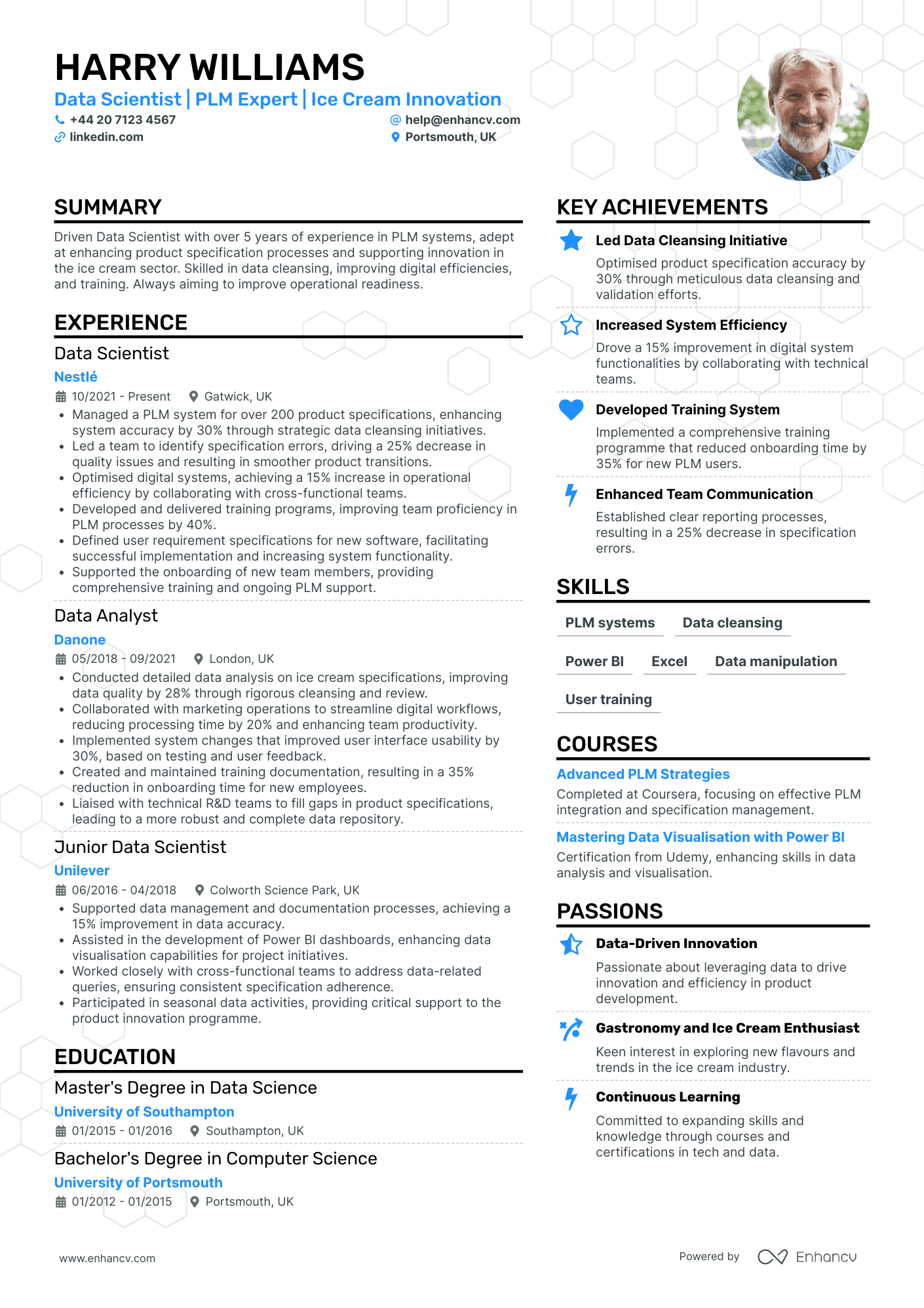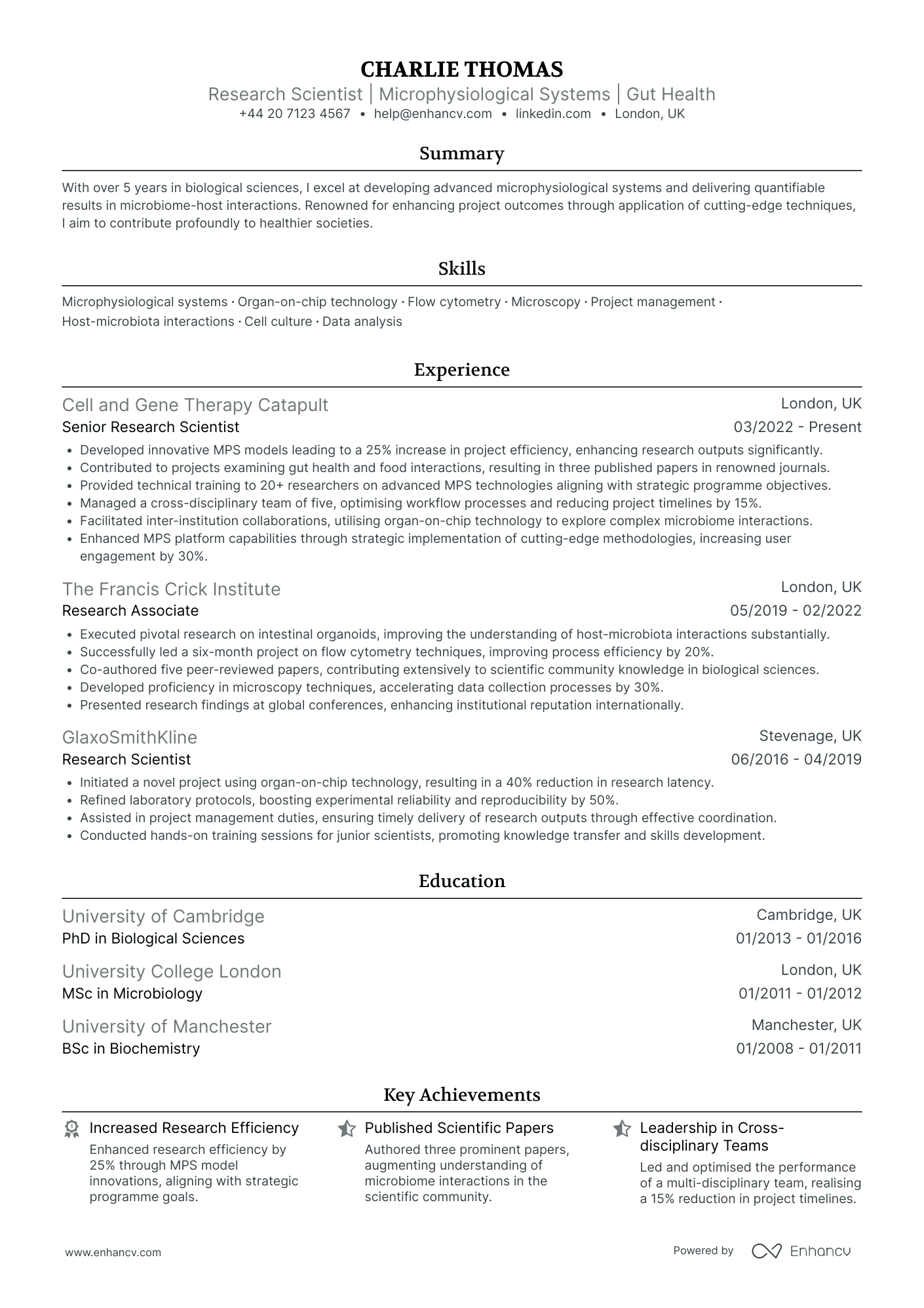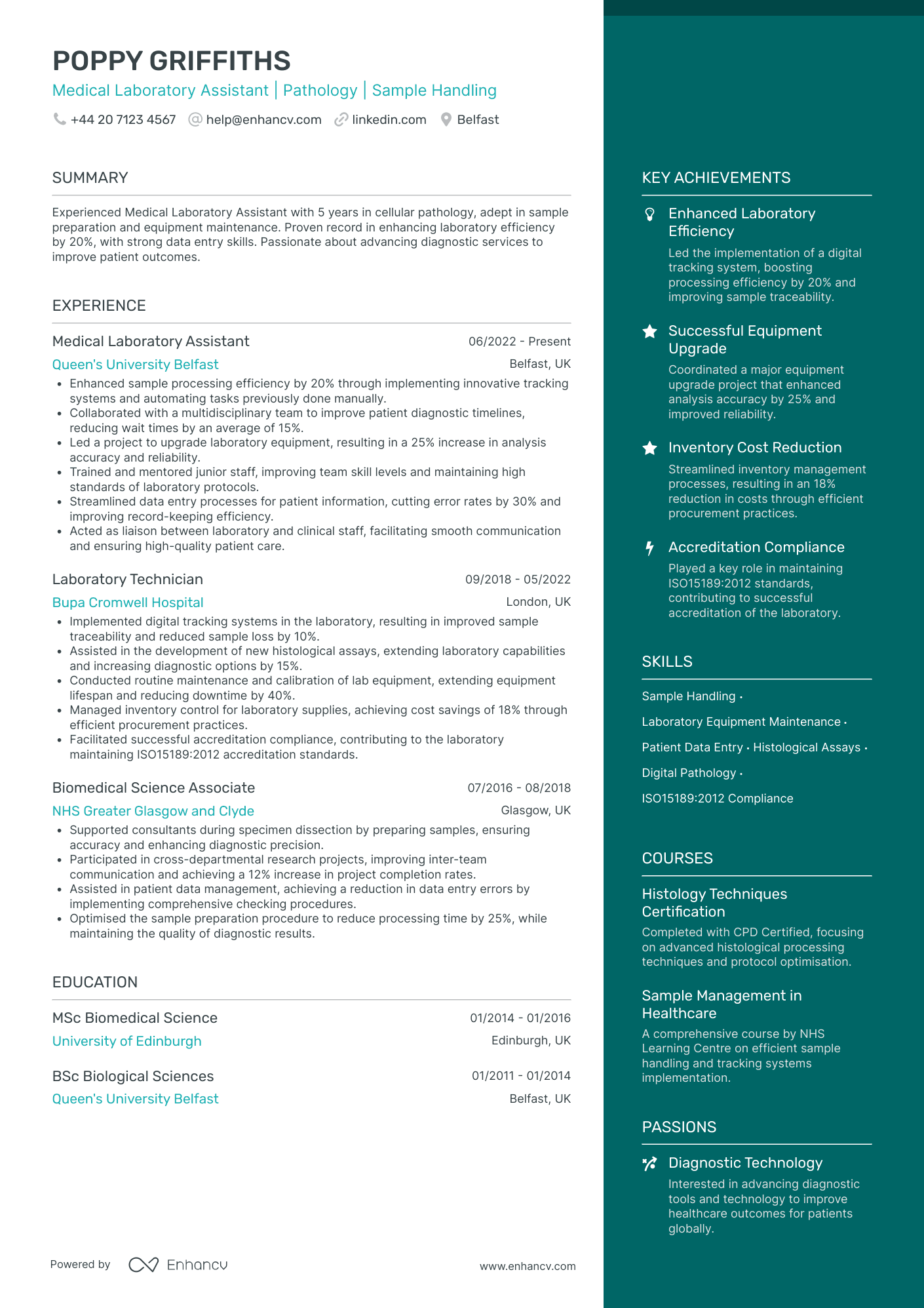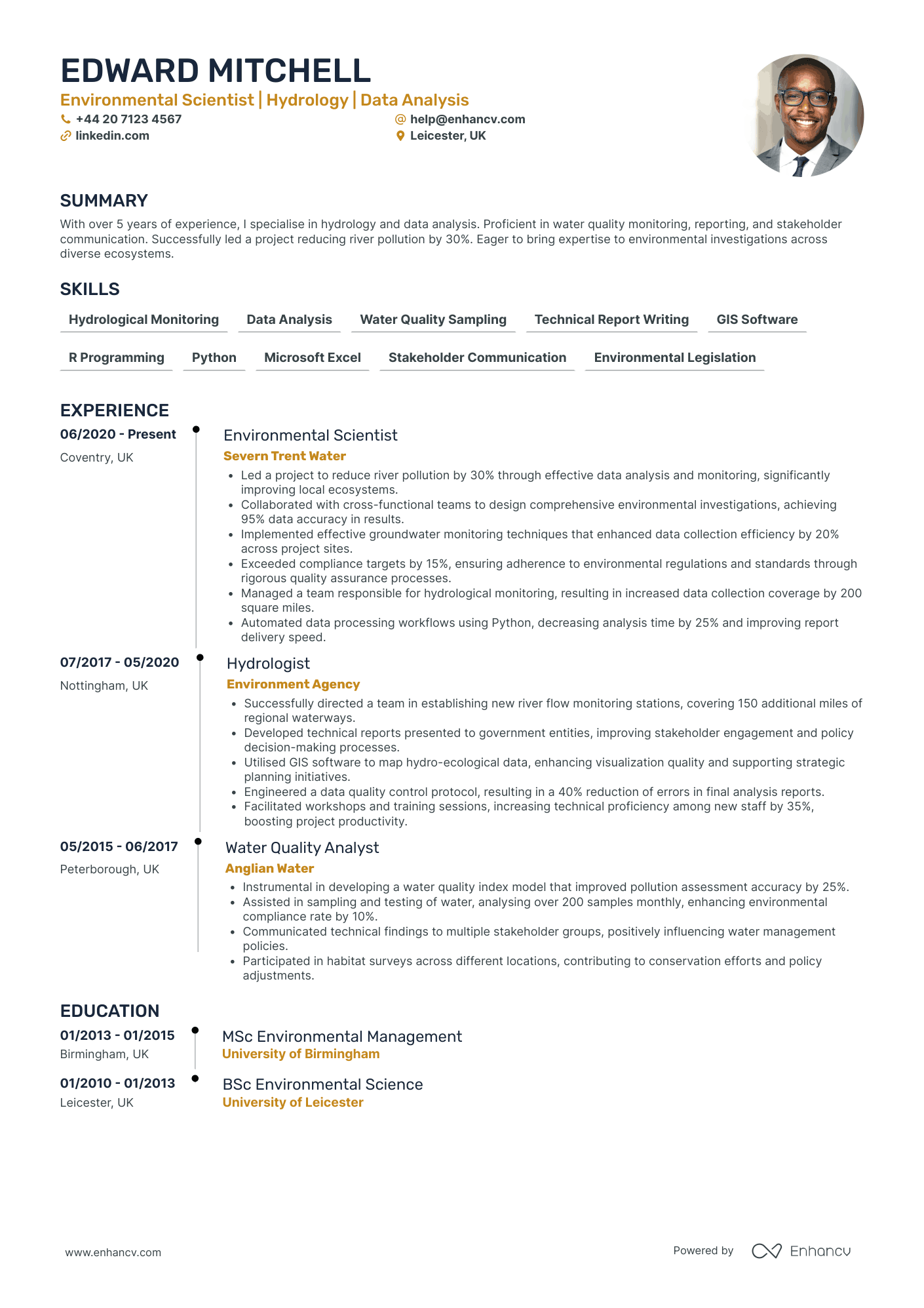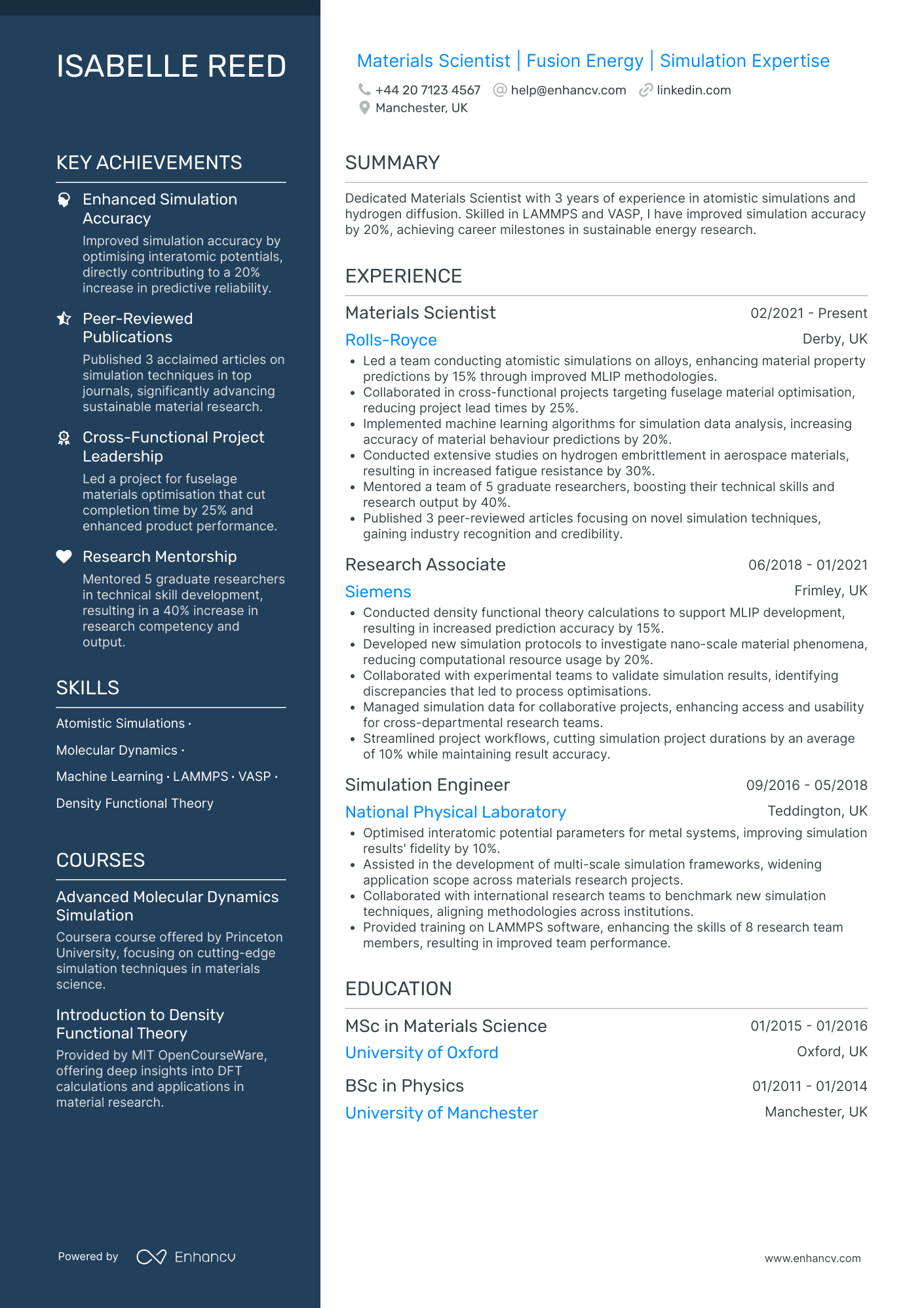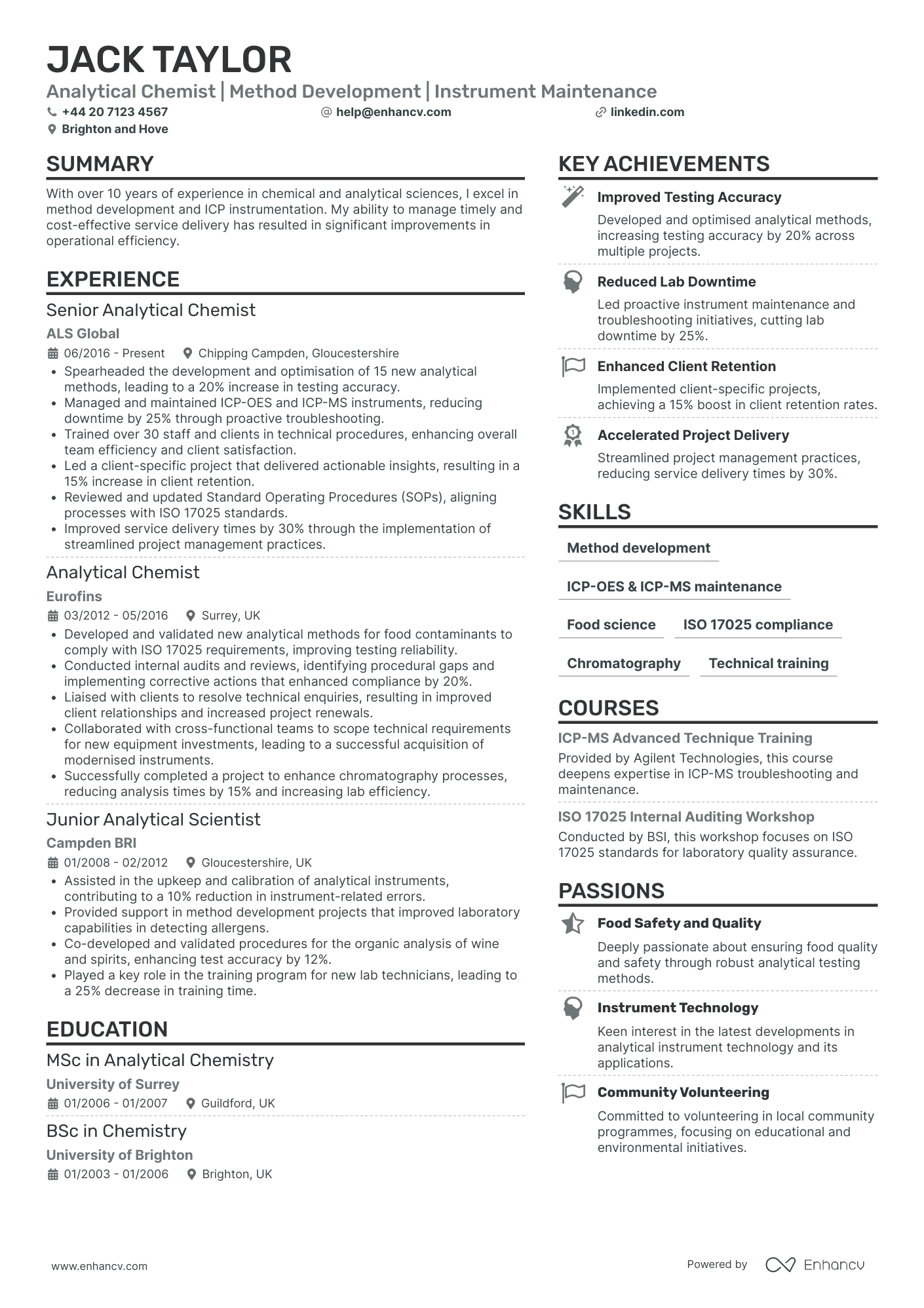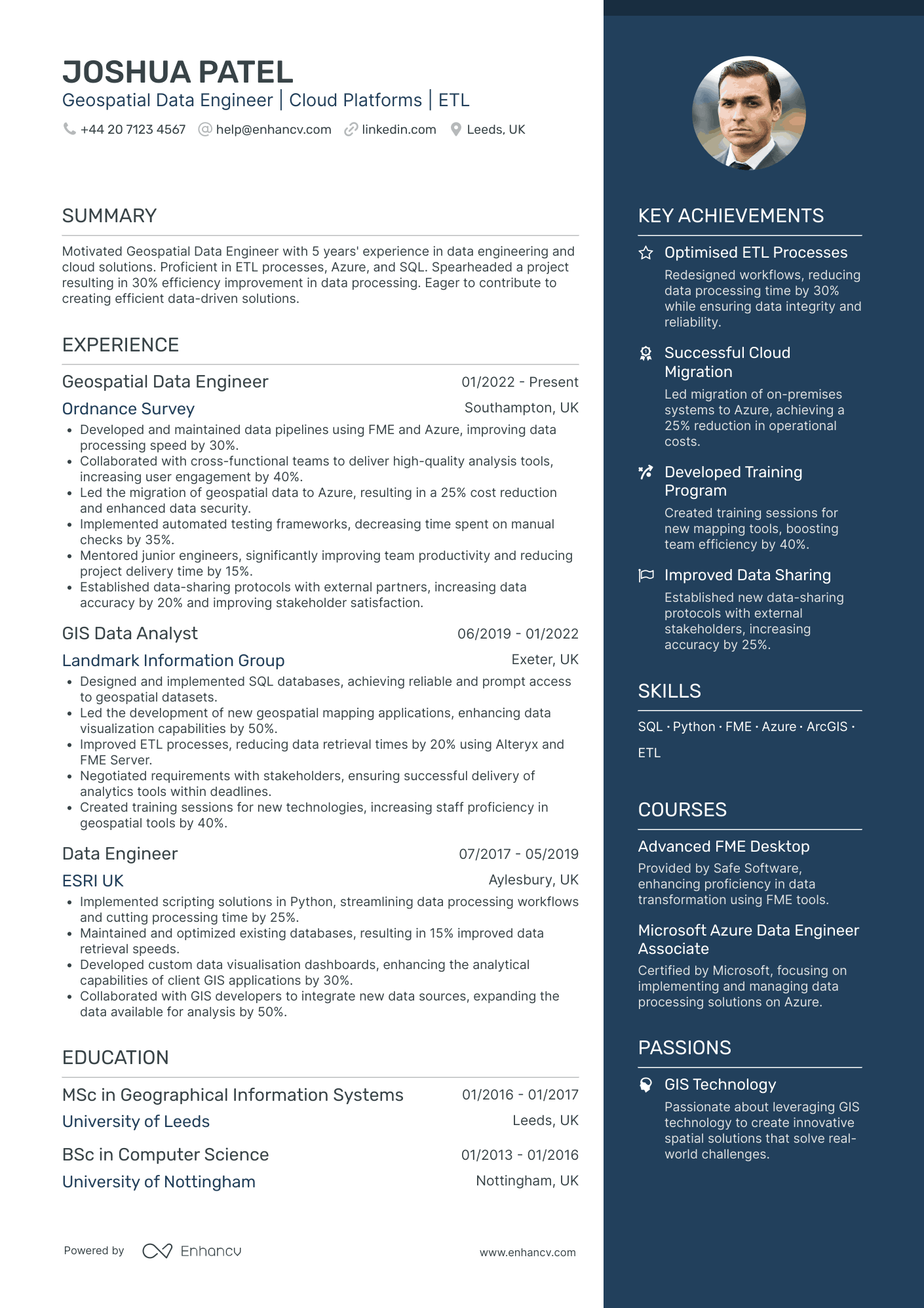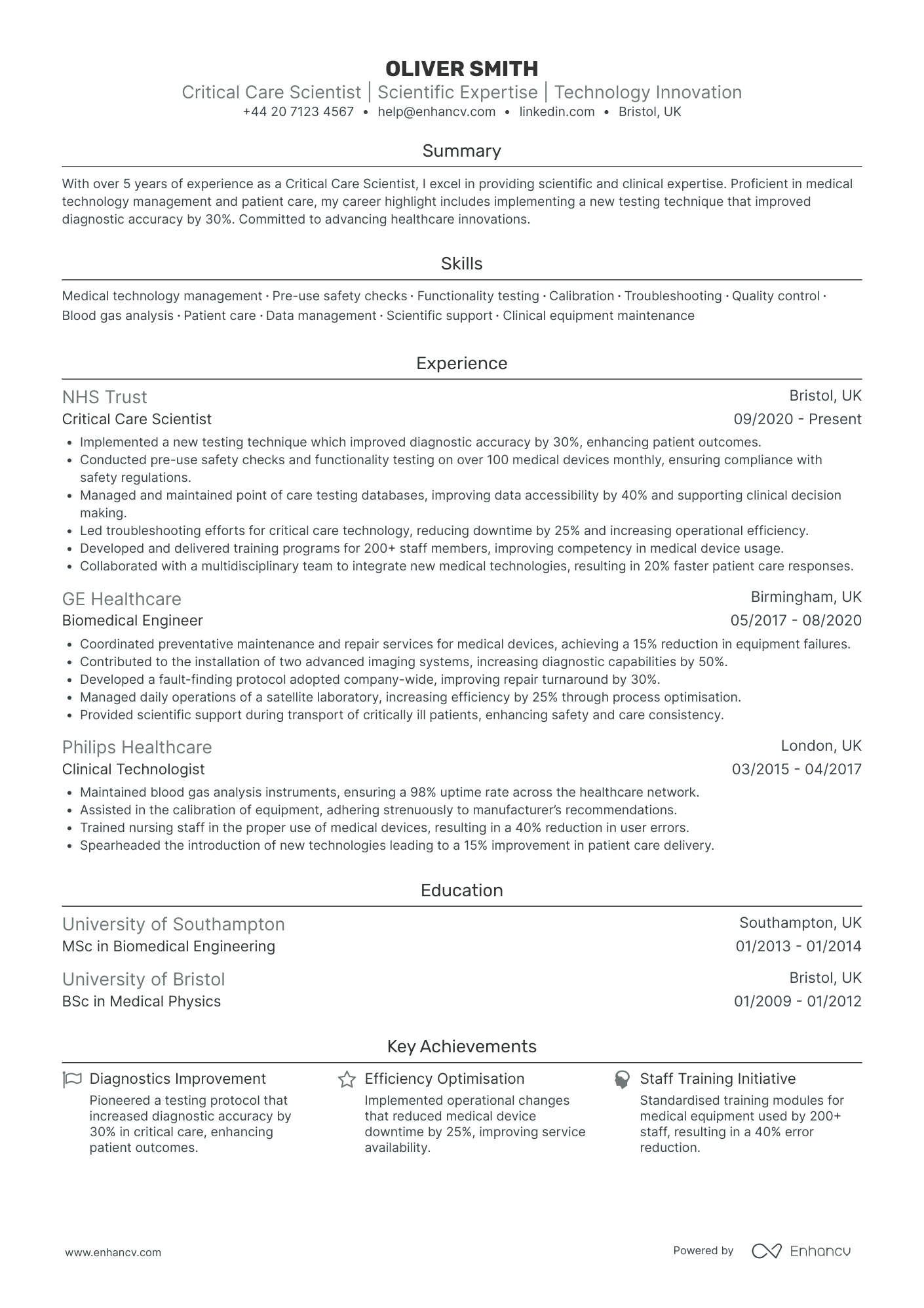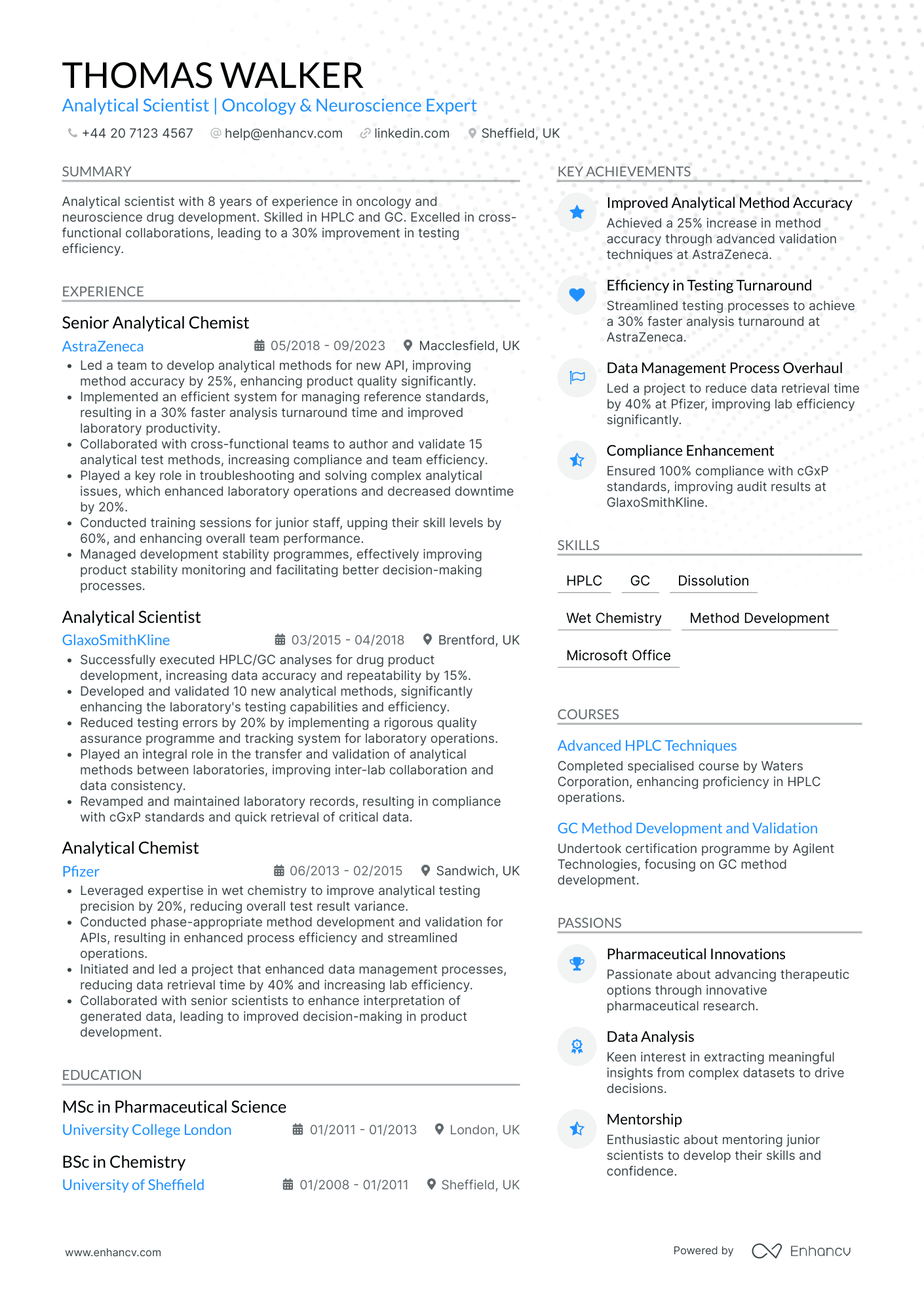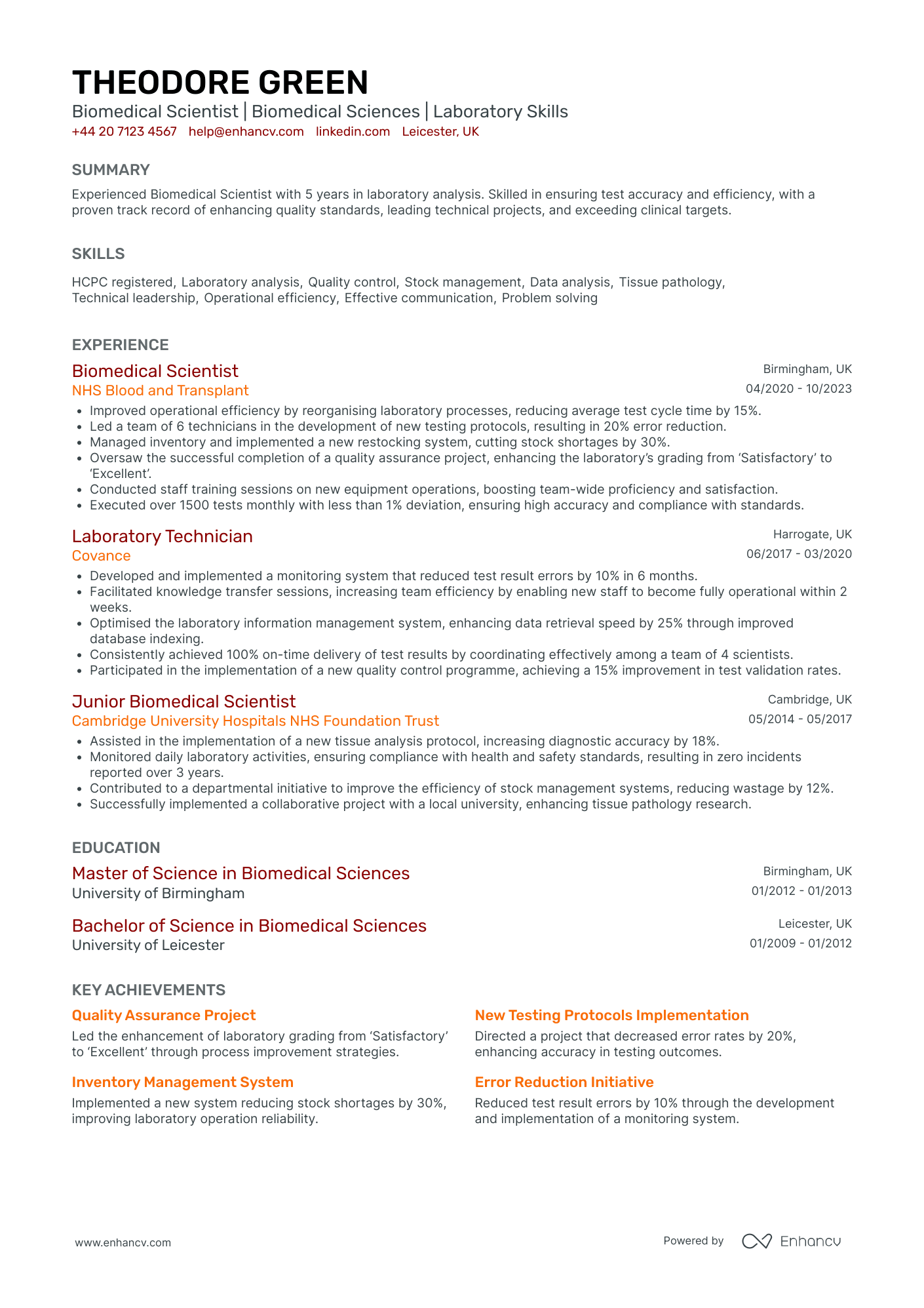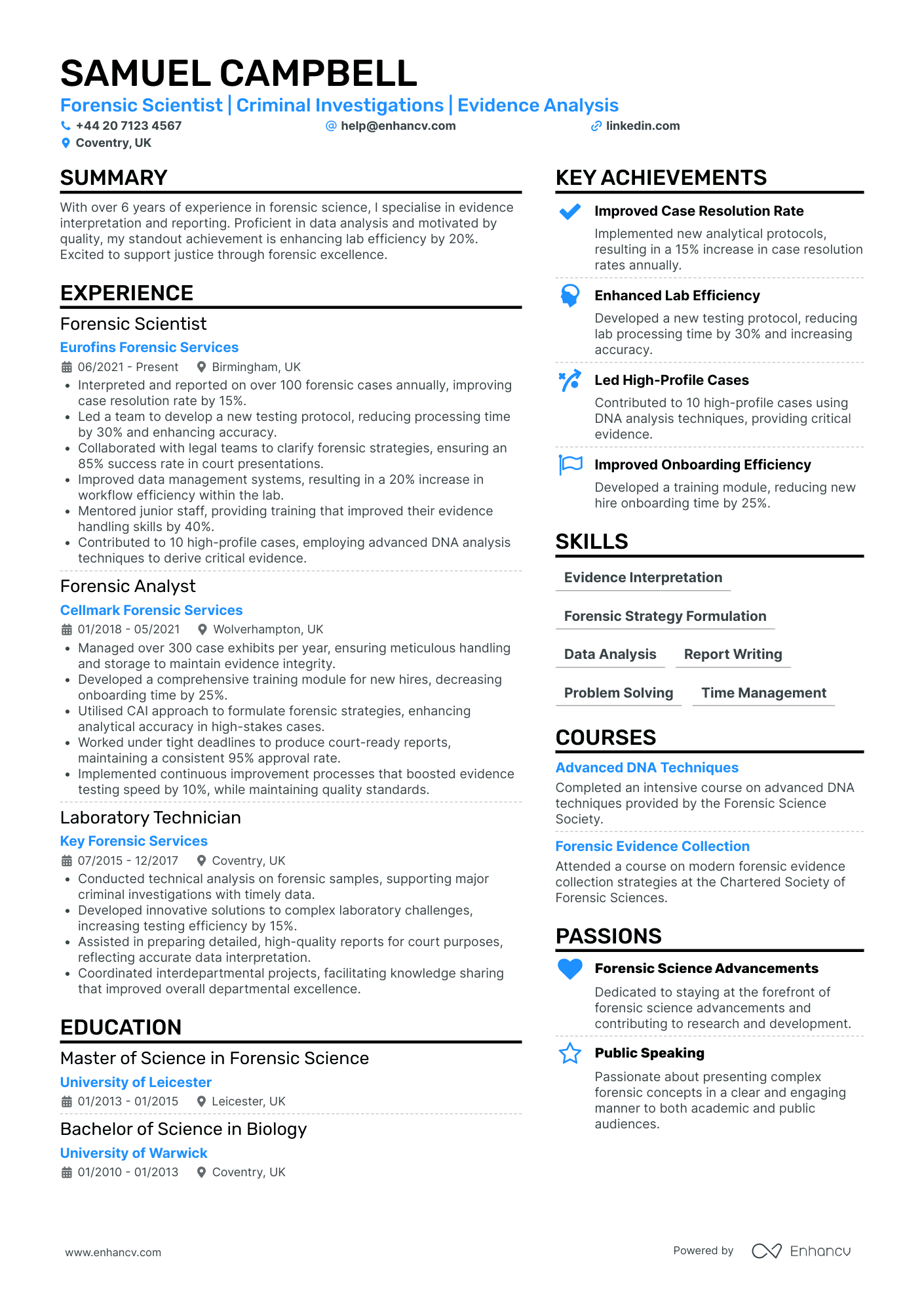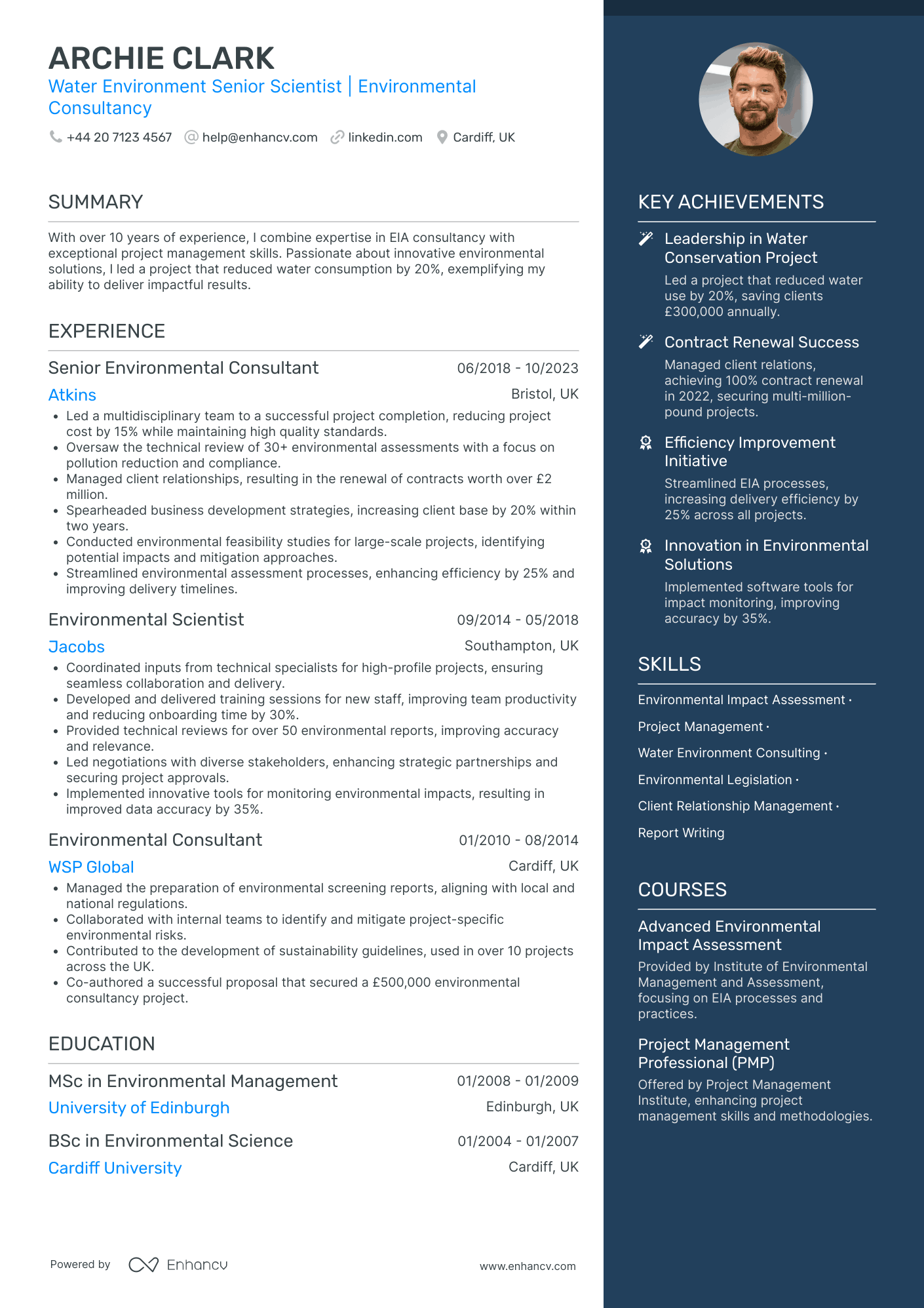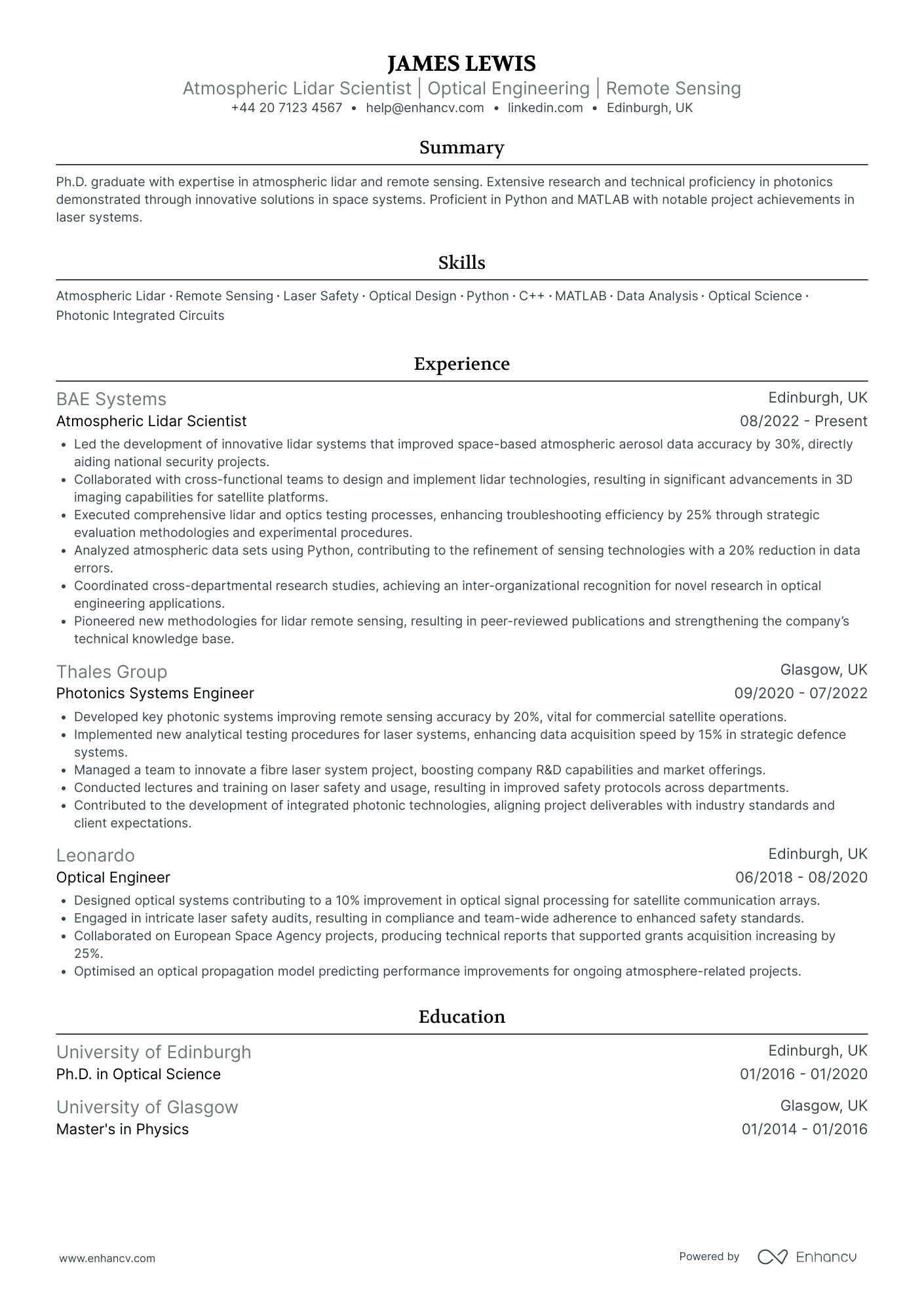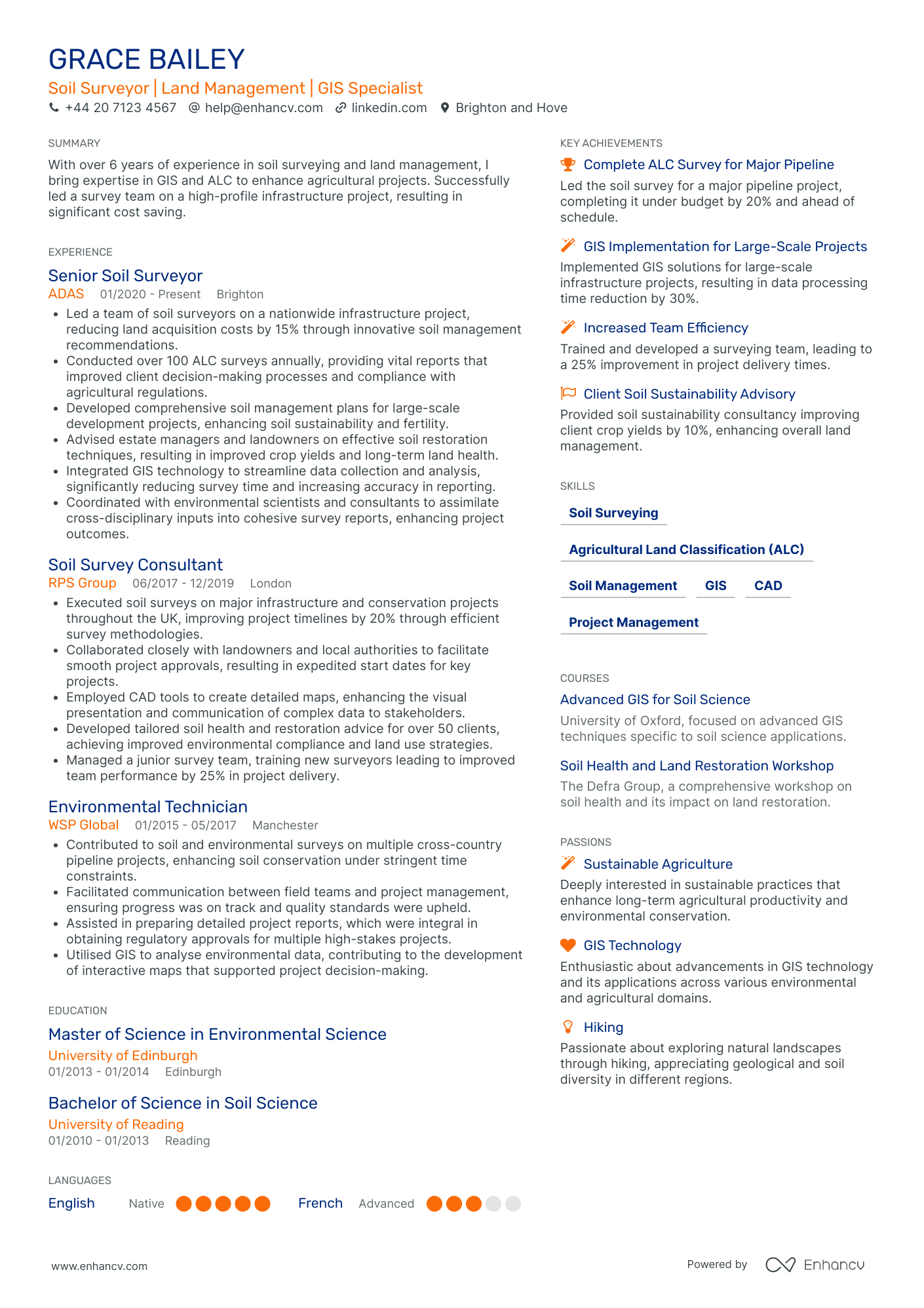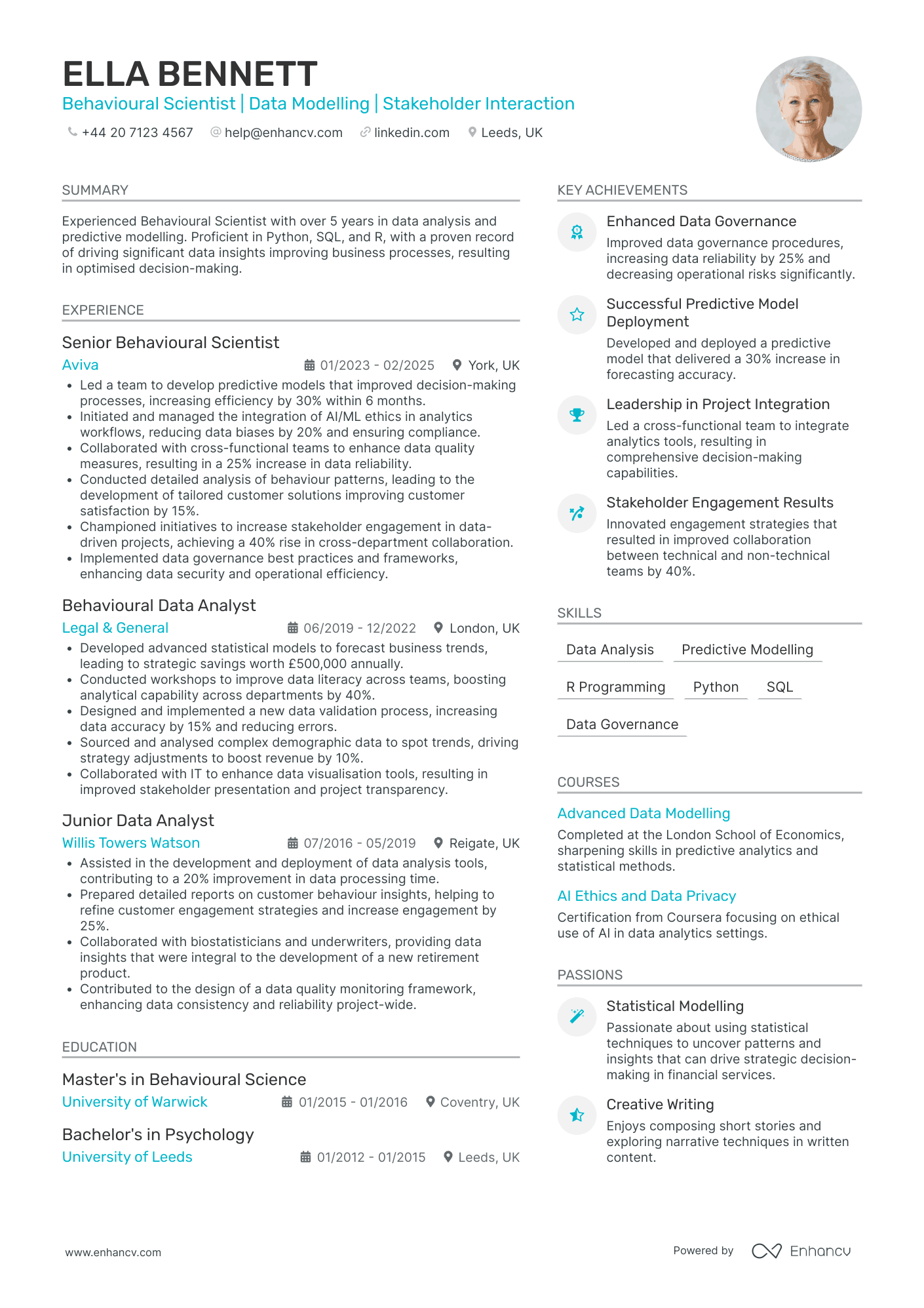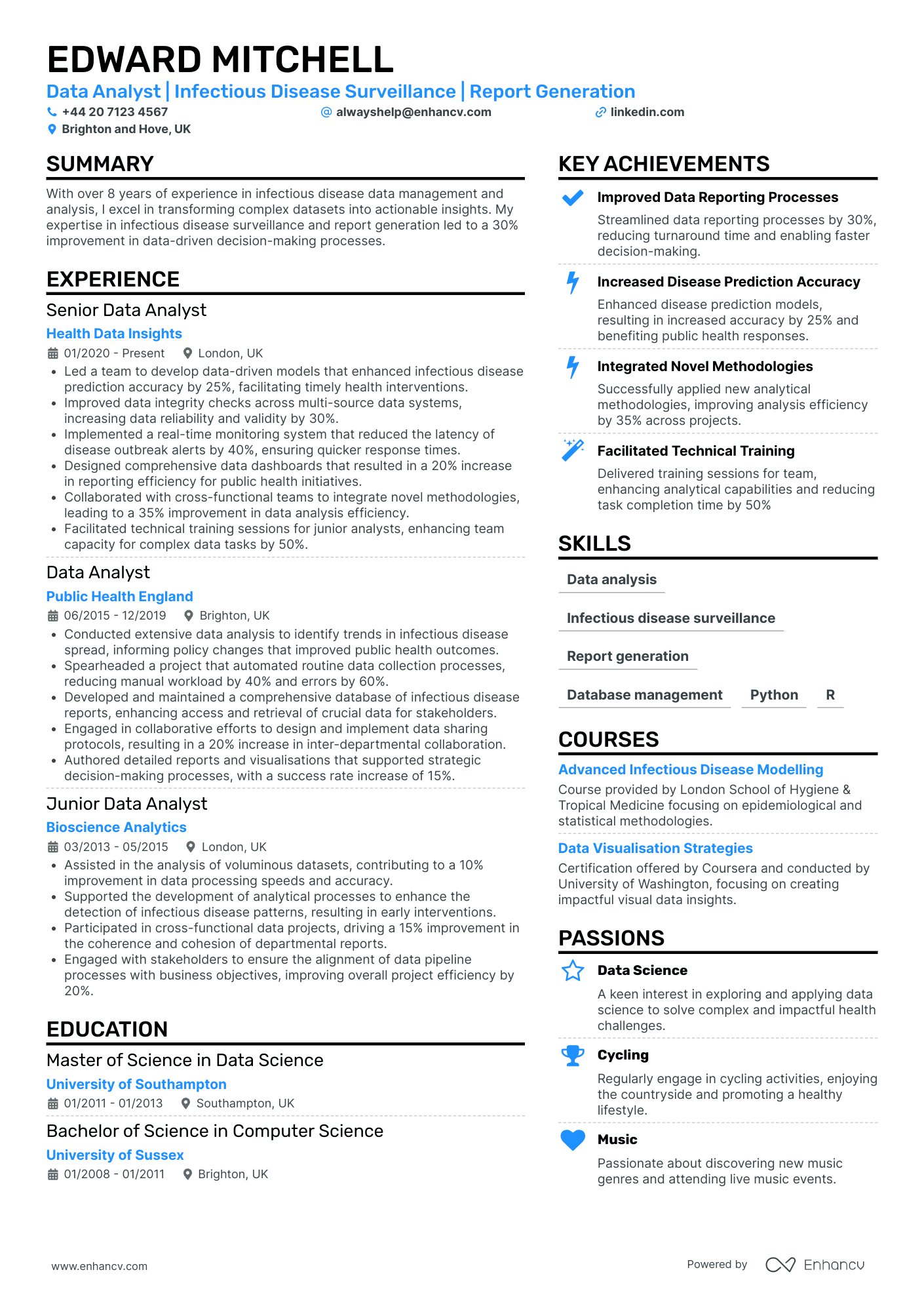Crafting a CV that effectively showcases your research, publications, and scientific achievements can be a daunting challenge. Our guide offers precise strategies and tips to help you structure your CV, ensuring it highlights your most impressive contributions and aligns with the expectations of academic and industry employers.
- Design and format your professional scientist CV;
- Curate your key contact information, skills, and achievements throughout your CV sections;
- Ensure your profile stays competitive by studying other industry-leading scientist CVs;
- Create a great CV even if you happen to have less professional experience, or switching fields.
When writing your scientist CV, you may need plenty of insights from hiring managers. We have prepared industry-leading advice in the form of our relevant CV guides.
CV examples for scientist
By Experience
Principal Scientist
- Effective Career Progression - The CV clearly outlines a notable career trajectory marked by progressive responsibilities, showcasing the candidate's growth from a Biotechnologist to a Senior Research Scientist. Each role is accompanied by tangible results, underlining the candidate's adaptability and readiness for increased challenges.
- Leadership and Team Collaboration - A distinctive aspect of the CV is its emphasis on leadership abilities. The candidate has demonstrated effective project leadership and team coordination, as seen in achievements like leading cross-functional teams and delivering mentorship, which promotes team efficiency and skill development.
- Innovations and Contributions to Scientific Community - The CV emphasizes the candidate's impactful contributions to the field of biotechnology, especially in oncology. The development of novel therapies and successful publication records in top journals highlights a strong focus on innovative research that aligns with industry advancements and academic excellence.
Junior Scientist
- Streamlined Presentation and Clarity - The CV is well-structured, with clearly defined sections, making it easy to follow the candidate's professional journey. Each segment, including experience, education, and skills, is concisely presented, reflecting the candidate's ability to prioritize critical information effectively.
- Diverse Career Trajectory in Environmental Science - Scarlett Murphy's career progression is marked by consistent growth in the environmental science field, from an Environmental Intern to a Project Coordinator, and finally advancing to an Urban Forestry Specialist. This progression indicates a deepening specialization and commitment to advancing ecological and community engagement goals.
- Impactful Achievements with Quantifiable Outcomes - The CV highlights Scarlett’s ability to achieve measurable outcomes, such as a 33% increase in community participation and a 50% rise in species richness. These accomplishments demonstrate a strong capacity for achieving targets that align with and support climate-responsive and ecological resilience goals.
Chief Scientist
- Clear and Concise Content Presentation - The CV is well-structured, providing a clear overview of Charlotte Powell's qualifications and accomplishments. Each section is concise yet comprehensive, offering detailed bullet points where needed and ensuring that key achievements and responsibilities are highlighted without overwhelming the reader.
- Impressive Career Trajectory - Charlotte's career path demonstrates significant growth, moving from a Research Scientist role to a position as Chief Scientist. This progression reflects her increasing responsibilities, leadership capabilities, and the trust placed in her by prestigious institutions in the field of astrophysics.
- Integration of Unique Industry-Specific Elements - The CV emphasizes Charlotte's expertise in radio astronomy interferometry and spectral analysis techniques, which are niche yet vital skills in her field. Such technical depth adds significant value, distinguishing her from peers and reinforcing her position as a leader in astrophysical research.
By Role
Data Scientist
- Structured Experience with Gradual Growth - The CV showcases a clear career trajectory, beginning as a Junior Data Scientist and progressing to a Data Scientist role. This demonstrates the candidate's growth within the field of data science, especially as they moved through established companies like Unilever, Danone, and Nestlé.
- Specialization in Product Lifecycle Management (PLM) Systems - A unique aspect of this CV is its emphasis on PLM systems, which indicates a deep specialization within the data science domain. This technical depth is reflected in the candidate's work on enhancing product specifications and system accuracy, a critical component in sectors like food production.
- Business-Relevant Achievements - The CV features numerous achievements that are not only quantifiable but also show significant business impact. For instance, a 30% improvement in product specification accuracy and a 25% reduction in quality issues indicate a substantial contribution to product innovation and operational efficiency.
Research Scientist
- Highly Structured Content Presentation - The CV is meticulously organized with clear sections including experience, education, skills, and achievements. Each section is well-articulated, allowing easy navigation and a concise presentation of complex information. The clear chronology and bullet points enhance readability and make it straightforward for the reader to digest the candidate's professional journey and capabilities.
- Strong Career Progression Highlights - The CV illustrates a notable career trajectory, starting from a Research Scientist at GlaxoSmithKline to a Senior Research Scientist position at Cell and Gene Therapy Catapult. This progression underscores the candidate's upward growth in responsibilities and skills, proving their adaptability and potential for continued advancement in their field. The inclusion of cross-disciplinary team management further underlines leadership capabilities.
- Focus on Industry-Specific Expertise - Unique attention is given to the candidate’s experience with cutting-edge microphysiological systems and organ-on-chip technologies. These specialized skills are highly valued in the field of gut health and microbiome research, providing the candidate with a distinctive edge. Recognizing these methodologies demonstrates not only technical competence but also the ability to lead projects that push the boundaries of current scientific knowledge.
Clinical Laboratory Scientist
- Clear Structure and Conciseness - The CV is structured in a clear manner, with distinct sections dedicated to career highlights, education, skills, and achievements. This organized presentation facilitates easy navigation and immediate identification of key qualifications, ensuring that each component succinctly conveys vital information without overwhelming details.
- Career Growth and Industry Expertise - Poppy Griffiths demonstrates a focused career progression within the field of pathology and laboratory science, moving from a Biomedical Science Associate to a Medical Laboratory Assistant role. This trajectory highlights not only her advancement but also her growing expertise and leadership within the healthcare and pathology sectors.
- Impactful Achievements with Business Relevance - The CV goes beyond mere numeric accomplishments, illustrating how Poppy’s initiatives, such as implementing digital tracking systems and upgrading laboratory equipment, translated into tangible business enhancements. By improving sample traceability and analysis accuracy, these achievements profoundly impact laboratory operations and patient care quality.
Environmental Scientist
- Strong Career Progression - Edward Mitchell's CV outlines a steady career trajectory, showcasing a clear advancement through roles with increasing responsibility and complexity. Starting as a Water Quality Analyst and progressing to an Environmental Scientist and Hydrologist, his path reflects significant professional growth and a deepening specialization in hydrology and environmental data analysis.
- Rich Technical Competency - The CV highlights Edward's expertise in using specific tools and methodologies essential to the field of environmental science. His proficiency in GIS software, R programming, and the automation of data processing with Python underscores his technical depth and capability to enhance workflows, which can be a significant advantage in data-driven environmental projects.
- Achievement-Oriented - Edward’s CV effectively communicates the business relevance of his achievements. The specific outcomes from projects he led, like reducing river pollution by 30% and automating data processes to improve efficiency by 25%, are not just statistics but demonstrate impactful contributions to environmental health and operational excellence. These achievements signal his ability to effect positive change within the industry.
Materials Scientist
- Organized Content Presentation - The CV is structured with clear sections, using concise language that focuses on the applicant's key skills and achievements. Each section follows a logical order, providing a smooth reading experience and allowing the reader to easily identify essential elements such as skills, work experience, and education. This clarity ensures that nothing important is overlooked.
- Demonstrates Strong Career Growth - Isabelle Reed showcases significant professional development, moving from roles like Simulation Engineer to a leading position as a Materials Scientist at Rolls-Royce. This trajectory highlights her consistent upward movement within the field, achieving increasing responsibility and recognition for her contributions to materials science, particularly in innovative projects that align with her passion for sustainable energy.
- Expertise in Specialized Tools and Methodologies - The CV details Isabelle's proficiency in advanced tools such as LAMMPS and VASP, essential in atomistic simulations and materials research. Her capability to integrate machine learning with simulation techniques underlines a depth of technical expertise, setting her apart as a highly knowledgeable candidate in the field of materials science and fusion energy.
Food Scientist
- Comprehensive Career Trajectory - This CV illustrates a clear career path with progressive roles within analytical chemistry, detailing growth from a Junior Analytical Scientist to a Senior Analytical Chemist. Each position highlights increased responsibilities, such as method development and team leadership, reflecting a continuous upward trajectory in skills and expertise.
- Diverse Skill Set with Industry-Specific Expertise - The document showcases an impressive array of industry-specific skills, from method development to maintaining complex instruments like ICP-OES and ICP-MS. The inclusion of certifications and professional courses further solidifies the candidate's technical depth and commitment to staying updated with the latest industry standards.
- Notable Business Impact Through Achievements - Achievements are linked directly to business outcomes, like a 20% increase in testing accuracy and a 15% boost in client retention. This demonstrates the candidate's ability to not only handle technical roles but also drive significant operational improvements and client satisfaction, enhancing the organization's bottom line.
Geospatial Scientist
- Clarity and Structure in Presentation - The CV is well-organized with clear headings and sections that allow for quick navigation through the candidate's history. Each section is structured to provide concise yet comprehensive information, making it easy for hiring managers to pick out key highlights and details relevant to the role of a Geospatial Data Engineer.
- Progressive Career Growth - There is a clear trajectory of advancement from roles in data analysis to increasingly responsible engineering positions. This progression reflects the candidate’s commitment to skill development and expertise within the geospatial data domain, ultimately leading to a senior engineering role at Ordnance Survey where they are now spearheading impactful projects.
- Technological Expertise and Industry Tools - The CV showcases a robust understanding of industry-specific tools such as FME, Azure, and ArcGIS. These, combined with experiences in ETL and cloud platforms, highlight the candidate's technical depth and readiness to tackle complex geospatial data challenges, distinguishing them as a highly skilled professional in the field.
Medical Scientist
- Structured Presentation of Technical Expertise - Oliver Smith’s CV is meticulously organized, with each section clearly delineated, making it easy to navigate. The concise bullet points allow for quick absorption of key information, outlining his contributions and achievements efficiently without overwhelming the reader.
- Comprehensive View of Career Progression - The CV showcases a clear progression in Oliver's career from a Clinical Technologist to a Critical Care Scientist, highlighting increasing responsibilities and roles within reputable healthcare organizations like NHS Trust and GE Healthcare. This progression underscores his growth within the critical care and biomedical engineering fields.
- In-depth Knowledge of Industry-specific Innovations - Oliver’s CV demonstrates his deep understanding of critical care technology and innovation. The mention of implementing new testing techniques and developing fault-finding protocols reflects his technical depth and active contribution to enhancing diagnostic accuracy and operational efficiencies within the healthcare sector.
Pharmaceutical Scientist
- Clear and Structured Content Presentation - The CV is meticulously organized, with clearly defined sections such as experience, education, skills, and achievements. Each section is concisely presented, ensuring that key information is easily accessible and the reader is guided seamlessly through Thomas Walker's professional journey.
- Demonstrated Career Progression and Industry Expertise - Thomas Walker's career trajectory highlights significant industry experience, moving from an Analytical Chemist at Pfizer to a Senior Analytical Chemist at AstraZeneca. The progression illustrates a steady climb in responsibilities and expertise in oncology and neuroscience, underscoring his competency in drug development and laboratory management.
- Technical Proficiency and Methodological Expertise - The CV stands out with its emphasis on industry-specific tools and methodologies, such as HPLC and GC techniques. The inclusion of specialized coursework and achievements in method accuracy further demonstrates technical depth and a continuous commitment to improving analytical processes.
Biomedical Scientist
- Cohesive Career Progression - Theodore Green's CV displays a structured career trajectory, evolving from a Junior Biomedical Scientist to a leading role at a prominent healthcare institution. His upward movement within the field is highlighted by increased responsibilities, from assisting in projects at Cambridge University Hospitals to leading teams and improving operational efficiency at NHS Blood and Transplant.
- Impactful Achievements with Business Relevance - The CV shines with clear, quantifiable achievements that underscore Theodore's impact in the biomedical field. Notable accomplishments include reducing test cycle time by 15% and decreasing error rates by 20%, which not only demonstrate technical proficiency but also portray significant contributions to improving clinical efficiency and accuracy.
- Adaptability and Cross-functional Experience - Theodore's ability to excel in various roles showcases his adaptability across different facets of biomedical science. His experiences range from optimizing laboratory management systems to leading quality assurance projects and developing new testing protocols, indicating his readiness to tackle diverse challenges within the laboratory setting.
Forensic Scientist
- Clear and structured content presentation - The CV is well-organized with distinct sections ranging from experience and education to skills and additional courses. This structured format allows easy navigation and ensures that key elements such as proficiency in forensic strategies and evidence interpretation are immediately noticeable. It succinctly summarizes Samuel Campbell's credentials and achievements, offering a clear narrative of his professional journey.
- Proven career trajectory with professional growth - Samuel Campbell's career path demonstrates a clear progression in responsibilities and roles. Starting as a Laboratory Technician, he advanced to a Forensic Analyst and now holds a position as a Forensic Scientist. This trajectory not only indicates career growth but also his ability to adapt and excel in higher-stakes environments. Evident in his leadership roles, including mentoring and protocol development, Samuel has consistently moved towards positions demanding greater expertise and influence.
- Emphasis on industry-specific achievements - The CV showcases Samuel Campbell's impact through specialized achievements relevant to forensic science, such as enhancing lab efficiency by 30% with a new testing protocol. His contributions to high-profile cases using advanced DNA techniques highlight his technical depth and ability to manage complex forensic challenges. Furthermore, his skills in evidence management and forensic strategy formulation underline his professional significance in criminal investigations.
Marine Scientist
- Effective Organization and Clarity - The CV is expertly structured and concise, allowing for quick and easy navigation through the candidate’s extensive professional experience. Each section is appropriately titled and includes relevant information, making it straightforward to understand the candidate's strengths and qualifications in environmental consultancy.
- Demonstrated Career Growth - Archie Clark's career trajectory illustrates a clear path of professional growth, moving from an Environmental Consultant at WSP Global to a Senior Environmental Consultant at Atkins. This progression underscores Archie’s expanding role responsibilities and the increasing complexity of the projects managed, indicating a steady advancement in the field.
- Innovative Solutions and Impact - The CV highlights unique industry-specific elements, such as the development of innovative tools for monitoring environmental impacts, which improved data accuracy by 35%. It also emphasizes leadership in a water conservation project that achieved significant cost savings for clients, reflecting Archie’s proactive approach and tangible contributions to environmental management.
Atmospheric Scientist
- Clear Structure and Concise Presentation - The CV stands out with its crisp and well-organized layout, allowing the reader to easily capture essential information at a glance. Each section is clearly defined and concise, making it simple for hiring managers to navigate through the candidate's qualifications and achievements without being overwhelmed by unnecessary details.
- Progressive Career Trajectory - James Lewis demonstrates a clear path of career growth, starting from an Optical Engineer to an Atmospheric Lidar Scientist. This progression highlights his consistent advancement in the field, showcasing his ability to take on more complex roles and responsibilities within reputable companies such as Leonardo and BAE Systems.
- Innovative Industry-Specific Methodologies - The CV emphasizes James’s expertise in unique industry-specific methodologies such as lidar and photonics systems development. These specialized skills underscore his deep technical knowledge and ability to contribute significantly to advancements in remote sensing and optical engineering technologies.
Soil Scientist
- Strong career trajectory and consistent growth - Grace Bailey's career progression is clearly exemplified through her roles, advancing from an Environmental Technician to a Senior Soil Surveyor. This trajectory indicates her ability to assume greater responsibility and leadership in the field of soil surveying and land management.
- Effective incorporation of industry-specific tools - The CV showcases Bailey's expertise in GIS and CAD, which are critical tools in soil surveying and land management. Her implementation of these technologies reflects her commitment to enhancing accuracy and efficiency in her projects, making her a valuable asset to any team.
- Leadership and cross-disciplinary collaboration - Grace has demonstrated effective leadership in managing survey teams and collaborating with environmental scientists and consultants. This ability to coordinate cross-disciplinary efforts underlines her skills in bringing together diverse expertise to achieve cohesive project results.
Social Scientist
- Structured and Comprehensive Presentation - The CV stands out for its well-organized layout, with clearly defined sections that guide the reader through the candidate's professional journey. Each section builds upon the previous one, creating a smooth narrative that highlights both technical and leadership capabilities.
- Consistent Career Advancement in Analytics - Ella Bennett's career trajectory demonstrates consistent growth and specialization within the field of data science and behavioral analysis. Starting as a Junior Data Analyst and moving up to a Senior Behavioural Scientist role showcases her depth of experience and ability to take on increasing responsibility.
- Integration of Ethics in Data Analysis - A notable aspect of Ella's profile is her focus on integrating AI/ML ethics into analytics workflows. This commitment not only highlights her technical acumen but also her dedication to ensuring ethical standards in data science, an area increasingly vital in today's data-driven landscape.
Political Scientist
- Comprehensive career progression - Edward's career trajectory is well-mapped, showing a clear advancement from Junior Data Analyst to Senior Data Analyst in a domain-specific field. His progression within the public health sector from Bioscience Analytics to Public Health England, and then to Health Data Insights, demonstrates both professional growth and increased responsibility in infectious disease surveillance.
- Integration of technical expertise with cross-industry methodologies - The CV illustrates Edward's ability to blend technical skills in Python, R, and SQL with advanced infectious disease modeling and data visualization strategies. His education in computer science and data science underpins his technical depth, while courses in infectious disease modeling and data visualization showcase ongoing professional development and adaptation to industry specifics.
- Effective presentation of accomplishments and contributions - Edward's achievements are detailed with specificity and context, highlighting not just statistical improvements but also their practical implications for public health. For instance, his leadership in developing data-driven models that increase disease prediction accuracy by 25% underscores his impact on timely health interventions and policy-making.
Formatting your scientist CV to meet the role expectations
Staring at the blank page for hours on end, you still have no idea how you should start your professional scientist CV. Should you include more colours, two columns, and which sections? What you should remember about your CV format is this - ensure it's minimalistic and doesn't go over the top with fancy fonts and many colours. Instead, focus on writing consistent content that actually answers the job requirements. But, how about the design itself :
- Use the reverse chronological order to showcase your experience, starting with your most recent role;
- Include your contact details (email address, phone number, and location) - and potentially your professional photo - in the header;
- Must-have CV sections include summary or objective, experience, education, and skills: curate the ones that fit your profile;
- Your professional scientist CV should be between one-to-two pages long: select the longer format if you have more experience.
A little bit more about your actual CV design, ensure you're using:
- plenty of serif or sans serif font (e.g. Montserrat, Exo 2, Volkhov) as they are Applicant Tracker System (ATS) compliant. Avoid the likes of Arial and Times New Roman because most candidates' CVs are in this typography.
When submitting your CV, are you still not sure what format it should be? Despite the myth that has been circling around, most modern ATS systems are perfectly capable of reading PDFs. This format is an excellent choice as it keeps all of your information intact.
PRO TIP
Be mindful of white space; too much can make the CV look sparse, too little can make it look cluttered. Strive for a balance that makes the document easy on the eyes.
The top sections on a scientist CV
- Education details show academic background.
- Research experience highlights scientific contributions.
- Publications list displays scholarly output.
- Grants and funding prove the ability to secure resources.
- Conference presentations indicate communication skills.
What recruiters value on your CV:
- Highlight your research experience by detailing the projects you've worked on and the impact they've had on your field, making sure to include any peer-reviewed publications, patents or conference presentations.
- Emphasise any specialised laboratory or technical skills, as well as unique methodologies or instruments you are proficient with, that are relevant to the field of science you're applying to.
- Include a detailed education section, featuring your degrees, relevant coursework, and any academic honours or awards, as these credentials are crucial in establishing your scientific expertise.
- Outline your experience with securing funding by listing any grants or scholarships you've received, demonstrating your ability to support and manage research projects financially.
- Showcase your ability to collaborate and communicate complex ideas by mentioning any interdisciplinary projects, teaching or mentoring roles, and your contributions to scientific working groups or committees.
Recommended reads:
Our checklist for the must-have information in your scientist CV header
Right at the very top of your scientist CV is where you'd find the header section or the space for your contact details, headline, and professional photo. Wondering how to present your the name of the city you live in and the country abbreviation as your address;
- are tailored to the role you're applying for by integrating key job skills and requirements;
- showcase what your unique value is, most often in the form of your most noteworthy accomplishment;
- select your relevant qualifications, skills, or current role to pass the Applicant Tracker System (ATS) assessment. Still not sure how to write your CV headline? Our examples below showcase best practices on creating effective headlines:
Examples of good CV headlines for scientist:
Dr Jane Smith Principal Research Scientist | Immunology & Genomics Expert | PhD | 15+ Years of Experience
Dr Edward Brown Senior Climate Analyst | Climate Change Mitigation Strategies | MSc Environmental Science | 10 Years' Expertise
Dr Alice Johnson Chief Data Officer | AI & Machine Learning Enthusiast | Data Analytics PhD | 20 Years in Data Science
Dr Michael Davis Lead Marine Biologist | Ocean Conservation | Biodiversity Specialist | PhD | 8 Years Fieldwork
Dr Lily Evans Head of Quantum Research | Quantum Computing | Physics PhD | 12+ Years in Quantum Technologies
Dr Richard Wilson Advanced Materials Engineer | Nanotechnology & Biomaterials | MEng | Chartered Engineer | 6+ Years Industry Lead
Catching recruiters' attention with your scientist CV summary or objective
Located closer to the top of your CV, both the summary and objective are no more than five sentences long and serve as an introduction to your experience. What is more, you could use either to entice recruiters to read on. Select the:
- Summary, if you happen to have plenty of relevant experience. Feature your most impressive accomplishments and up to three skills that are relevant to the job you're applying for;
- Objective, if you're just starting your career off. Provide your career goals and answer how you see the role you are applying for will match your professional growth.
Judging which one you need to add to your scientist CV may at times seem difficult. That’s why you need to check out how professionals, with similar to your experience, have written their summary or objective, in the examples below:
CV summaries for a scientist job:
- Accomplished biochemist with over 10 years experience in protein engineering and a track record in developing successful therapeutic candidates. Expert in mass spectrometry and chromatography with a Ph.D. from Cambridge. Noted for discovering a novel mechanism that doubled the efficiency of a leading drug candidate.
- Distinguished climate scientist with 15 years dedicated to advancing knowledge in atmospheric processes through innovative research at NOAA. Skilled in data analysis using R and Python, with significant contributions to the landmark global warming study that reshaped conservation policies globally.
- Former aerospace engineer aiming to transition into genetic research, bringing a decade of experience in systems modelling and complex problem-solving. Keen aptitude for computational biology, developed through self-driven study and a comprehensive nanodegree in bioinformatics. Eager to apply engineering precision to tackle genetic puzzles.
- Seasoned financial analyst with 12 years in venture capital, pivoting to bioscience with a Master’s in Biological Science from Imperial College. Proven analytical acumen and statistical expertise, poised to cross-apply financial modeling techniques to biological data sets to extract actionable insights in pharmaceutical investment strategies.
- Recently graduated microbiologist, passionate about exploring the intersection of immunology and technology to forge paths in disease prevention. Seeking to engage deeply in pioneering research that will develop cutting-edge medical solutions, despite the absence of formal experience in the field.
- As an enthusiastic recent MSc Environmental Science graduate, I am eager to apply my theoretical knowledge and passion for sustainability to make a tangible impact in combating climate change, through harnessing renewable energy technologies and contributing to research despite my current lack of direct industry experience.
The best formula for your scientist CV experience section
The CV experience section is the space where many candidates go wrong by merely listing their work history and duties. Don't do that. Instead, use the job description to better understand what matters most for the role and integrate these keywords across your CV. Thus, you should focus on:
- showcasing your accomplishments to hint that you're results-oriented;
- highlighting your skill set by integrating job keywords, technologies, and transferrable skills in your experience bullets;
- listing your roles in reverse chronological order, starting with the latest and most senior, to hint at how you have grown your career;
- featuring metrics, in the form of percentage, numbers, etc. to make your success more tangible.
When writing each experience bullet, start with a strong, actionable verb, then follow it up with a skill, accomplishment, or metric. Use these professional examples to perfect your CV experience section:
Best practices for your CV's work experience section
- Highlight significant research projects you've spearheaded by stating the objective, the methodology you employed, and the results you achieved, making sure to quantify the impact when possible.
- Detail your publication record meticulously, listing your peer-reviewed articles, books, and other publications, as well as any significant citations and the impact factor of journals where your work appeared.
- Emphasise your technical skills, such as expertise in laboratory procedures, statistical analysis software, programming languages, or specialised equipment you're proficient in operating.
- Include any academic teaching experience you have, outlining the courses or workshops you have designed or delivered and any supervisory roles you've held over students or junior staff members.
- Present your involvement in academic conferences, specifying the presentations or posters you contributed, any sessions you chaired, and the scope and reach of these events.
- Detail the grants and funding you have secured for your research, identifying the source, the competitive nature of the award, and the amount, which helps highlight your ability to attract financial support.
- Outline your collaborative projects with other institutions, industry partners, or international organisations, specifying your role and the outcome of these partnerships.
- Mention membership in professional societies and any leadership positions you've held within them, which can display your professional standing and commitment to your field.
- Provide a synopsis of your patent portfolio if applicable, illustrating your track record of innovation and contribution to the commercial and academic impact of your work.
- Spearheaded the development of a novel gene editing technique that increased precision by 35%, significantly reducing off-target effects in CRISPR-Cas9 applications.
- Directed a cross-functional team of 12, leading to the publication of 5 research papers in high-impact journals, enhancing the company’s scientific reputation.
- Implemented a robust data analysis pipeline using Python and R, boosting research efficiency and data integrity, which contributed to a 20% increase in project throughput.
- Managed the analysis of over 1000 soil samples annually for contamination levels, aiding in the identification of pollution trends and informing policy change recommendations.
- Designed and executed a comprehensive water quality monitoring program, resulting in the improvement of local water treatment practices and enhanced public health standards.
- Collaborated with regulatory bodies to establish eco-friendly industrial processes, culminating in a 15% regional reduction in industrial waste.
- Led a groundbreaking study that identified two novel biomarkers for early-stage Alzheimer's disease, potentially impacting diagnostic procedures for millions.
- Optimized laboratory workflow through the implementation of automated ELISA platforms, accelerating the screening process by 50% and cutting operational costs.
- Conducted pivotal Phase II clinical trial assessments, paving the way for a new, effective therapeutic agent, and attracting venture capital funding of £10 million.
- Played a key role in the development and FDA approval of a novel antidiabetic drug, which now contributes to 20% of company revenue.
- Optimized chemical synthesis routes for 3 major drug compounds, reducing production time by 30% and material waste by 25%.
- Orchestrated high-throughput screening campaigns assessing over 500 compounds, which accelerated the identification of lead candidates by six months.
- Developed predictive models for pharmaceutical sales forecasting, enhancing accuracy by 40%, directly influencing inventory management and production planning.
- Implemented a machine learning-based system for real-time patient data analysis, improving patient outcome predictions and individualizing treatment plans.
- Streamlined the data reporting process, creating interactive dashboards that reduced report generation time from 3 hours to 30 minutes.
- Orchestrated a large-scale clinical study with over 3,000 participants, which substantiated the efficacy of a new cardiovascular drug entering Phase III trials.
- Cultivated strategic partnerships with 10+ academic institutions, fostering collaborative research and stretching the company’s clinical research capabilities.
- Mentored a team of junior scientists, nurturing talent and leading to a 30% increase in the department's research output over three years.
- Pioneered the development of a new composite material that reduced production costs by 20% while maintaining optimal performance standards.
- Instrumental in securing a £5 million grant for advanced material research from the UK government, cementing the company's position as a leader in materials innovation.
- Enhanced material testing protocols, which improved product lifespan by an average of 25%, markedly increasing customer satisfaction and product competitiveness.
- Developed a novel catalytic process that increased production yield for a key pharmaceutical ingredient by 15%, significantly reducing costs and environmental impact.
- Served as the primary investigator for a project that resulted in two patents for cleaner chemical processes, enhancing the company’s intellectual property portfolio.
- Fostered a culture of continuous improvement, leading to a team-wide adoption of Six Sigma methodologies and a 20% improvement in process efficiency.
Swapping your professional experience (when you have none) with skills and more
Never underestimate the importance of relevancе when it comes to your scientist CV. Even if you don't happen to have much or any standard (full-time contract) professional experience, this doesn't mean you shouldn't apply for the role. Instead of a bespoke CV experience section:
- Showcase more prominently any internships, part-time roles, and volunteer experience that are applicable to the role and have taught you job-crucial skills;
- Feature a strengths or achievements section with your transferrable skills or talents you've obtained thanks to your work or life experience;
- Write an objective statement that clearly outlines your values as a candidate and defines your career ambitions;
- List your education or certificates that match the job profile closer to the top of your CV.
Recommended reads:
PRO TIP
Describe how each job helped you grow or learn something new, showing a continuous development path in your career.
Describing your unique skill set using both hard skills and soft skills
Your scientist CV provides you with the perfect opportunity to spotlight your talents, and at the same time - to pass any form of assessment. Focusing on your skill set across different CV sections is the way to go, as this would provide you with an opportunity to quantify your achievements and successes. There's one common, very simple mistake, which candidates tend to make at this stage. Short on time, they tend to hurry and mess up the spelling of some of the key technologies, skills, and keywords. Copy and paste the particular skill directly from the job requirement to your CV to pass the Applicant Tracker System (ATS) assessment. Now, your CV skills are divided into:
- Technical or hard skills, describing your comfort level with technologies (software and hardware). List your aptitude by curating your certifications, on the work success in the experience section, and technical projects. Use the dedicated skills section to provide recruiters with up to twelve technologies, that match the job requirements, and you're capable of using.
- People or soft skills provide you with an excellent background to communicate, work within a team, solve problems. Don't just copy-paste that you're a "leader" or excel at "analysis". Instead, provide tangible metrics that define your success inusing the particular skill within the strengths, achievements, summary/ objective sections.
Top skills for your scientist CV:
Laboratory Skills
Data Analysis
Research Design
Technical Writing
Statistical Analysis
Scientific Computing
Field Work
Project Management
Quality Control
Subject Matter Expertise
Critical Thinking
Problem Solving
Communication
Adaptability
Teamwork
Attention to Detail
Time Management
Innovation
Resilience
Continuous Learning
PRO TIP
Focus on describing skills in the context of the outcomes they’ve helped you achieve, linking them directly to tangible results or successes in your career.
Education and more professional qualifications to include in your scientist CV
If you want to showcase to recruiters that you're further qualified for the role, ensure you've included your relevant university diplomas. Within your education section:
- Describe your degree with your university name(-s) and start-graduation dates;
- List any awards you've received, if you deem they would be impressive or are relevant to the industry;
- Include your projects and publications, if you need to further showcase how you've used your technical know-how;
- Avoid listing your A-level marks, as your potential employers care to learn more about your university background.
Apart from your higher education, ensure that you've curated your relevant certificates or courses by listing the:
- name of the certificate or course;
- name of the institution within which you received your training;
- the date(-s) when you obtained your accreditation.
In the next section, discover some of the most relevant certificates for your scientist CV:
PRO TIP
If you have received professional endorsements or recommendations for certain skills, especially on platforms like LinkedIn, mention these to add credibility.
Recommended reads:
Key takeaways
Your successful job application depends on how you well you have aligned your scientist CV to the job description and portrayed your best skills and traits. Make sure to:
- Select your CV format, so that it ensures your experience is easy to read and understand;
- Include your professional contact details and a link to your portfolio, so that recruiters can easily get in touch with you and preview your work;
- Write a CV summary if you happen to have more relevant professional experience. Meanwhile, use the objective to showcase your career dreams and ambitions;
- In your CV experience section bullets, back up your individual skills and responsibilities with tangible achievements;
- Have a healthy balance between hard and soft skills to answer the job requirements and hint at your unique professional value.
